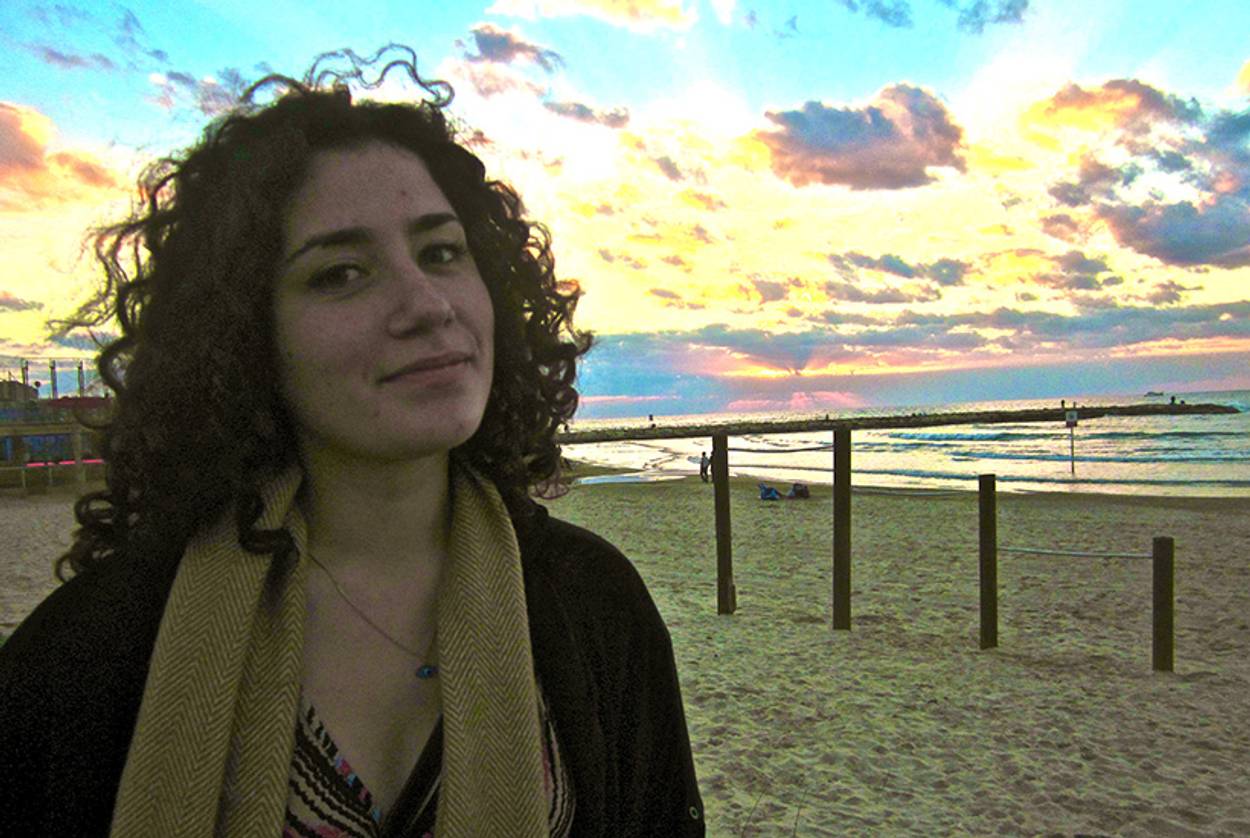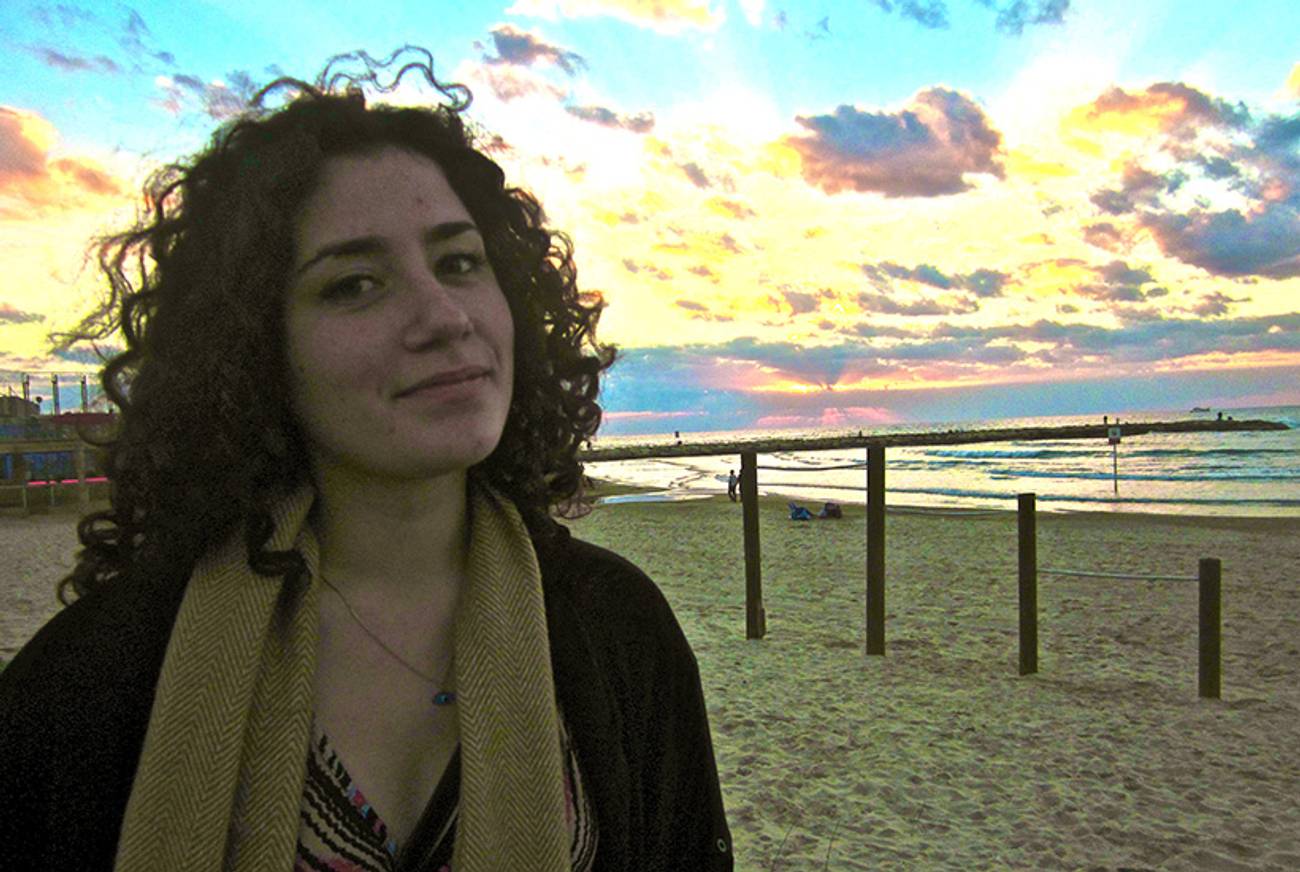When I Found a Place Where I Belonged, I Finally Came to Love My Jewish Hair
I grew up hating my curly, unruly frizz. But on a trip to Israel, I found people who celebrated kinky locks—theirs and mine.




I wanted to do something unforgettable during my semester abroad in Israel, so when a friend offered me a ticket to a trance music festival near Be’er Sheva, I jumped at the chance. When we boarded the charter bus outside Tel Aviv’s Arlozorov Station, gearing up for the impending four-hour drive to an ashram in the Negev, we were greeted by a dozen other festivalgoers: hippies, for lack of a better term, adorned in sequined fabric, body piercings, and tattoos. They carried with them their rave essentials—bongos, guitars, and a didgeridoo among them—but what struck me most was their hair.
It kinked and coiled without reservation. Dreads hung down heavy like elephant trunks and commanded the same respect. What we here endearingly refer to as the “Jewfro” is, in Israel, described as leefa—bushy, unruly hair. Tumbleweed hair. Curls that defy styling products. Unabashed frizz.
I considered my bundle of Jewish locks. Messy tendrils framed my face, tinged gold by the blazing sun. My own leefa, once a source of so much shame and frustration, was here not only common but a cause for celebration. These were my tribemates. The group on the bus began a lively jam session and, comforted by this realization, I relaxed. I had arrived.
I spent a lifetime hating my Jewish hair—straightening it, covering it, or otherwise finding ways to diminish its presence. A trip to Israel is what it took for me to realize my hair was wonderful all its own, and much more than just an accessory.
***
Four names sum up my tweenage years: Britney, Christina, Jessica, and Mandy. These were the reigning queens of pop music whose straight blonde locks were a permanent TV fixture throughout much of the early aughts and who epitomized many a pre-teen concept of what it meant to be an attractive female between 1999 and 2002. And I, an awkward Jewish preteen with frizzy brown hair and glasses, somehow did not fit the bill.
Whether or not my 10-year-old self should have been worrying about notions of sexiness is now a moot point. The notions were there, planted in my brain around the ripe age of pubescence, and the only way to escape their influence was to retreat into two areas of childhood that were supposedly harm-free: my home and my school.
But relying on school to protect me from any nascent body image issues was a lost cause. I was the only Russian Jew in our largely WASPy middle school in the suburbs of Central Jersey. I wasn’t the only Jew or the only minority—there were plenty of both—but I was the only female who sported the unfortunate combination of above-average height, ample body hair, glasses, a confused wardrobe from well-meaning immigrant parents, and my (quite literal) crowning glory: an untameable mass of frizzy dark curls that no local hairdresser, or even my own mother, had the faintest idea what to do with. This, coupled with early-onset puberty, was a recipe for the most awkward adolescence and subsequent teen years I could have asked for.
Being surrounded by petite blonde gentiles was one thing, as was being subject to the insidious beauty campaign American media so graciously plunged down my throat. Coming from a Russian-speaking culture, in which female beauty standards are heightened to astronomical levels of importance, is entirely another. Russian women, according to the innumerable creeps who take it upon themselves to point this out to me, are beautiful, plain and simple. But Russian-Jewish women are often not part of this equation. Whereas the Russo-Slavic female prototype is blonde, svelte, and sexy, my Ashkenazi sisters are, according to the aforementioned blockheads, decidedly not so. This is an absurd stereotype (as stereotypes tend to be), and the likes of Mila Kunis and Natalie Portman are testament to its absurdity. But over and over I internalized the message that goyish hair and slender, hairless bodies were pretty, and therefore I was not. As there were no prominent female figures who resembled me in pop culture; there was no one to assure me that my frizzy brown curls and broad shoulders were not just OK but lovely in their own way.
Instead, what I saw left and right were attacks on my selfhood. In sixth grade, I went to see The Princess Diaries with my mother. Finally, here was a female protagonist who bore an uncanny resemblance to me, complete with “Jewish” hair (despite the character not being Jewish). I was smitten. Then I watched as Mia Thermopolis’ beauty squad attacked her (read: my) hair with an arsenal of tools and hair products. She emerged from the dramatic makeover montage a girl reborn: glasses-free, with shiny straight locks and a face full of makeup. The following week, I straightened my hair for the first time and continued to do so regularly for the rest of middle school.
Years later, when I came to terms with my “otherness” but was still wracked with insecurity, my family moved to Brooklyn. At 15, I had yet to get comfortable in my own skin. As I grew accustomed to city life, I began to explore my identity and the elusiveness of feminine beauty. I later colored my curls, grew them out long and wore them freely, and lined my eyes—my father’s hazel eyes—with thick dark makeup. And people asked me: Are you Egyptian? Arab? Spanish? Greek? Never once did a stranger assume I was a Russian Jew.
It was my father who had the final say on the decision that changed my life—to study abroad in Tel Aviv in spring of 2011, my junior year of college. My parents are staunch Zionists, as many Soviet Jews tend to be, and Papa knew that releasing me from my parents’ clutches was the right way to go. I arrived in Israel without much in the way of expectations and was immediately taken aback by an overwhelming sense of belonging. Everywhere I looked, I saw evidence of consanguinity staring me in the face. Israelis are famously open, but I marveled not only at the familial atmosphere but by the fact that many locals physically resembled me. People addressed me in Hebrew, assuming I was one of them. Every other pedestrian looked like a cousin or an uncle. Their faces were my own.
I would also regularly catch glimpses of what was unmistakably my hair adorning the head of a stranger—and how stunning it looked on somebody else. Not speaking a lick of Hebrew, I admired passers-by in secret and kept mostly to myself (I tried my best to not seem like a tourist, knowing full well that plenty of Israelis speak English). But two months later at the rave, the galvanizing combination of loud music, desert, dance, and strobe lights finally convinced me to toss those reservations aside. When I found myself at the heart of the trance fest in the Negev, it didn’t matter that I grew up in the suburbs or didn’t speak Hebrew or couldn’t pitch a tent to save my life. I was one of the tribe; I danced badly and laughed wildly with the rest of them. And I marveled at the brazen display of hair—the manes upon manes of spectacular curls.
At that moment it felt like our hirsute tribal marking—a collection of people, once scattered among the far reaches of the globe, unified by a mutual love of Jewfros and electronica.
***
Today, at 24, I rarely reach for the straightening iron or struggle with matters of selfhood. But I walk the streets of my adopted city, New York, as detached and wary of the masses as I was a decade prior. The anonymity of existing in a metropolis is liberating only when one thrives off individualism, whereas I take solace in community and have tried desperately to find one of my own. The sense of place I felt in Israel has yet to be matched, and my physical features (chief among them, my hair) were only a fraction of the reason I felt at home there and alienated everywhere else. But there’s something to be said about stepping into a hair salon and not feeling like a piece of work, just as there is about stepping into crowd of people and not feeling like a stranger.
My friends, my family, and my significant other are all in the States, making aliyah an unlikely possibility. I would be lying if I said I have not entertained the idea, but instead of uprooting to the other side of the world, I’ve focused on building a community here. So far, I’m the only one with curly hair in my diverse group of friends and loved ones. But that doesn’t make me love them any less.
***
Like this article? Sign up for our Daily Digest to get Tablet Magazine’s new content in your inbox each morning.
Samantha Shokin is a writer and musician based in Brooklyn.
Samantha Shokin is a writer and musician based in Brooklyn.